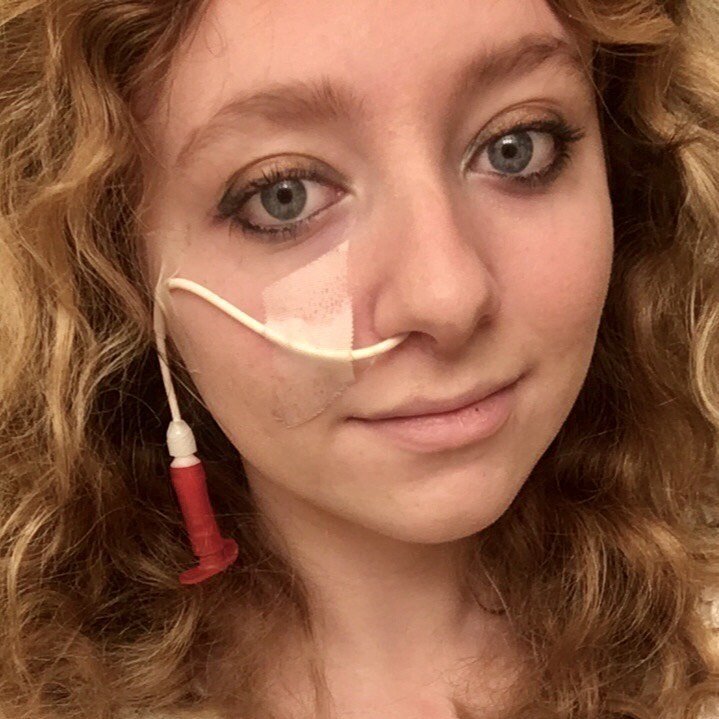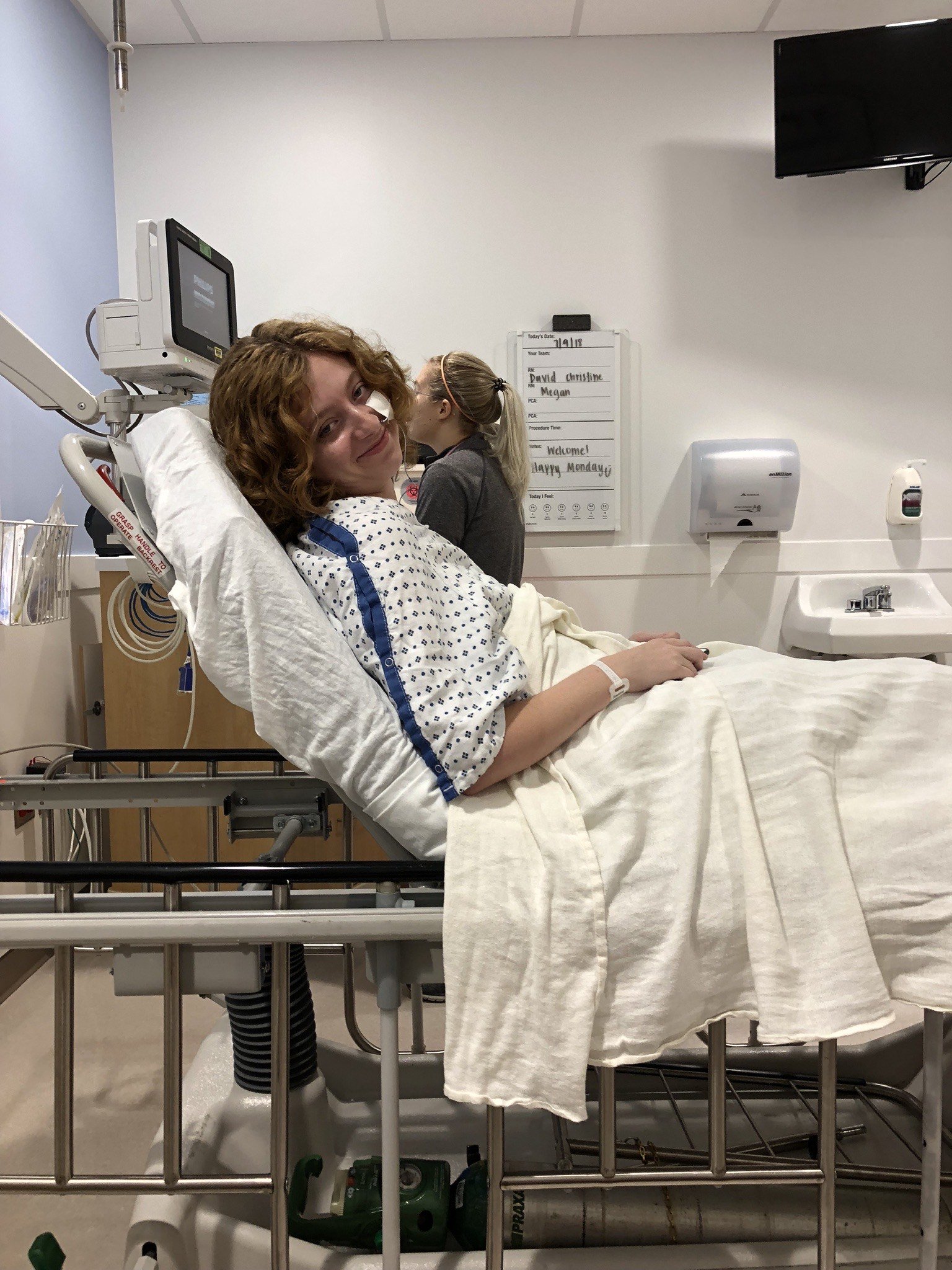Annelise - “A healthy body to me is one that keeps you alive and allows you to be as capable as you can be.”
Growing up, I had a stereotypical “normal” body. I was by no means the smallest or the largest person my age and medically I was very much so in the middle ground statistically. This all changed when I was 16. Randomly, my body began rejecting food almost entirely. I went from a very typical existence to struggling to even keep down something as simple as an egg or saltine crackers. To the external world, there was no visible signs of illness, but I quickly began to lose weight. This naturally alarmed my doctors and I had an onslaught of appointments and pharmaceutical interventions which all failed. I had a flurry of tests and was finally diagnosed with gastroparesis (or essentially the paralysis of the stomach) about a year after I became sick. I have had many tests performed since and a gastroelectrical stimulator (akin to a pacemaker) implanted in my stomach. I was lucky enough to receive a Smart Pill test down at Cleveland Clinic which showed that not only was my stomach delayed in terms of motility, but my entire digestive system was. The test was performed over 7-10 days and afterwards the pill capsule was still in my digestive system. I was finally later diagnosed with Hypermobile Ehler’s Danlos syndrome (which is a mutation of a type of collagen in the body) and Mast Cell Activation Syndrome, both are believed to cause all of my gastric issues.
Q & A
WHAT EXPERIENCES IN YOUR LIFE HAVE HAD THE BIGGEST EFFECT ON YOUR BODY IMAGE?
As I didn’t have answers for a long time as to why I was sick and high school being the often unkind place it is, I had multiple rumors spread about me that I had anorexia and bulimia due to my vomiting and that I was seeking treatment that when I missed school . The lack of explanation for my suffering and judgment from my peers definitely contributed to a resentment of my body. This was only furthered by my GI doctor at the time at U of M repeatedly refusing to try some treatments unless I was under 95 pounds. He was not alone in this devaluation of my illnesses and suffering, because I could easily mask it with some baggy clothes. It led to me developing a very distorted relationship with food that continues to this day and actively avoiding it to provide proof I am actually sick. I only started to be believed once I got my nasal feeding tube and later, my permanent feeding tube. Finally, there was visible proof that something was actually wrong with me, that I needed intervention to survive daily life. People instantly became kinder, more compassionate, and less argumentative with me.
Being believed was a double edged sword though. I had finally gotten down to weighing approximately 90 pounds at the time my feeding tube was inserted. I was very thin, but I was working as a barista at a coffee shop as I took a year gap in my schooling due to my illnesses, and I would constantly get compliments about my appearance. Guys would very often ask for my number and vocalize appreciation for my thinness. I finally fit society’s view of attractiveness and was a size 0. I had never loved my body more than then, and even as I slowly got better and could eat more, I refused to in order to keep the weight off, despite the fact I was underweight.
WHAT STEREOTYPE DO YOU FEEL ARE ASSOCIATED WITH YOU AND YOUR BODY?
The stereotype I see most prominently is that I don’t have serious medical issues or disabilities because there is nothing visibly wrong with me. I have been confronted and yelled at numerous times by people in parking lots for using my doctor issued permanent handicap parking placard because I’m seemingly “young and healthy.” The second stereotype is that thin is healthy, active, and attractive in society. In recent years, there has been a push for change in social media and ad campaigns and I am happy to see that. I was my most inactive and most unhealthy when I was my thinnest. Finally, scars and imperfections are ugly. I have started to learn to love all of my surgical scars that cover my abdomen (four alone in my belly button). They are a testament to what a person has overcome in their life and a part of their story that should instead be celebrated, whether it be scars, cellulite, stretch marks, or wrinkles.
WHAT DOES A HEALTHY BODY MEAN TO YOU?
A healthy body to me is one that keeps you alive and allows you to be as capable as you can be, while also being happy. That looks different for every person because we all have our unique struggles in life as well as our own goals. For me, that means maintaining a normal weight, being able to be at least somewhat active, and being able to chase my intellectual pursuits.
HOW DO YOU FEEL WE CAN SEE BODIES DIFFERENTLY AND HELP OTHERS DEVELOP A HEALTHIER BODY IMAGE?
I think we need to stop putting so much emphasis on the appearance of our bodies in general, especially our flaws. Everyone has flaws and it should be normal to simply acknowledge their existence. A person doesn’t have to love their flaws. I see them as only a sentence in a book. They contribute a bit to the story, but what we do, who we are, and who we impact are far bigger chapters. Our bodies are our vessels to life here on earth and they are what get us through every day. We should each take care of them, respect them, and even celebrate them, but they are also not who we are as an entire person.
That being said, I think it would be beneficial to further represent a diversity of bodies in popular culture and media. More importantly, highlighting this diversity as normal. And to stop putting an emphasis on projecting perfection to mass audiences, primarily through social media. There has been a shift towards this recently with brands like Aerie using a variety of models with different features and sizes, and also a number of people like Ashley Graham or Lizzo advocating for body diversity and acceptance, but there could be more, especially in the masculine side of things. Being able to see people similar to one’s self or with similar flaws helps make us more secure in our own flaws and make them a more normal part of life.
WHAT DO YOU LOVE AND APPRECIATE ABOUT YOUR BODY?
I love my body’s resiliency and appreciate it fighting to keep me alive despite all the parts of it that don’t work properly. I love that my body enables me to spend time with the ones I love and do the things that I love, even if that comes with limitations due to my illnesses. I still have the ability to decide what I want to do everyday, explore new things, and shape how my future will look. My body is simply the thing that will carry me through all of that. I appreciate my body’s ability to heal. Each one of my many scars is proof that I went through something hard, overcame it, and moved on from it. That my life can continue progressing forward.
WHAT IS A SHORT PIECE OF ADVICE YOU CAN GIVE TO OTHERS THAT MAY SHARE A SIMILAR EXPERIENCE?
Don’t be too hard on yourself if you are struggling. Talk to yourself like a friend. If it helps, imagine taking care of a friend and treat yourself how you would treat them. And you don’t have to listen to anyone else’s opinions about you or your body. Most people have no idea what another person is going through because a lot of it can be invisible but that doesn’t make it less valid or a person less worthy. Just do the best you can for yourself everyday, know that your best will probably look very different from day to day, and some days your best might just be getting out of bed.



